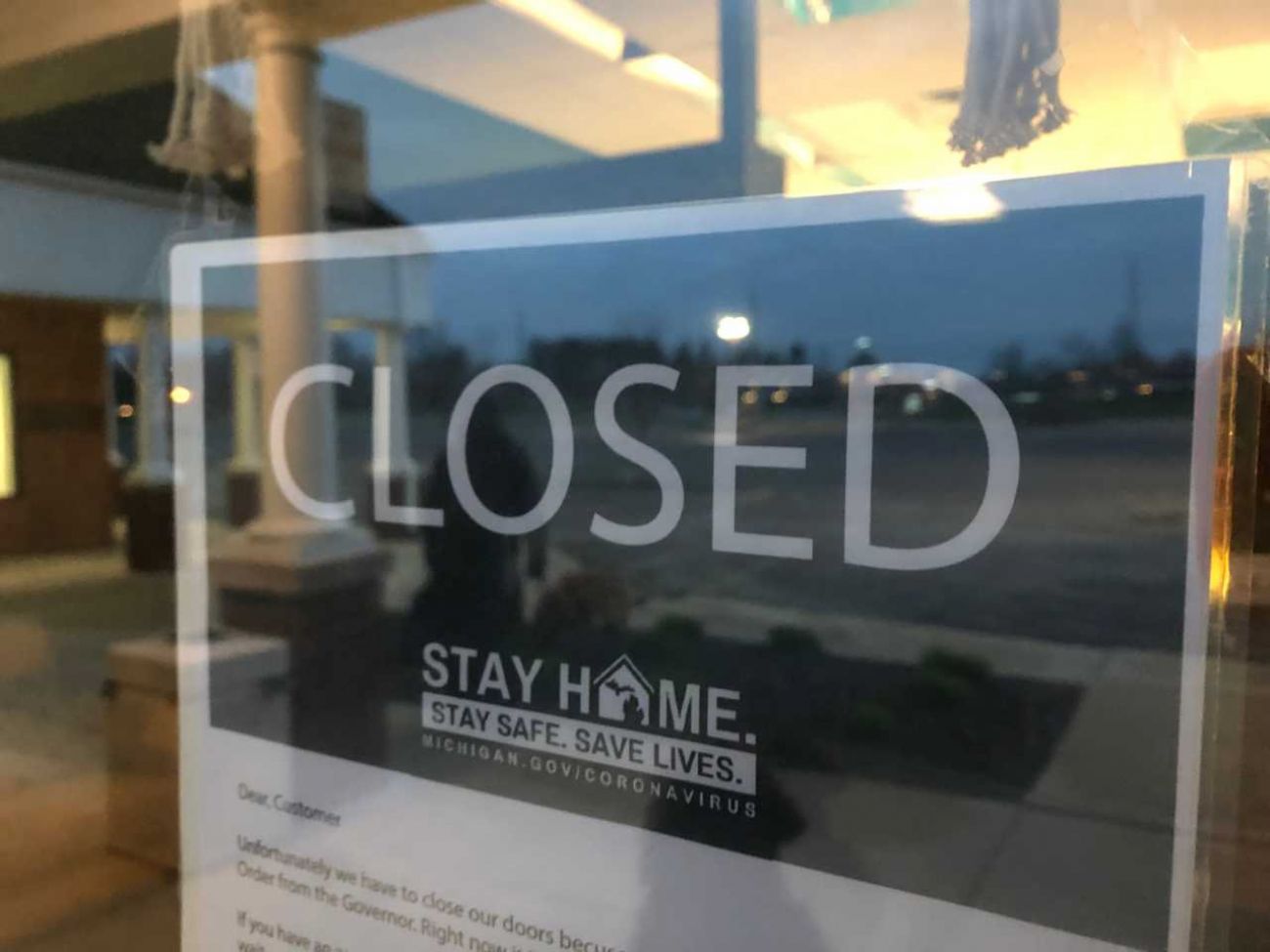Will Michigan Supreme Court rescue restaurants from COVID dining ban?

Michigan’s struggling bar and restaurant industry has lost a legal bid to resume indoor service. But the federal court ruling published Wednesday opened the door to the Michigan Supreme Court possibly weighing in on the legality of the state’s most recent coronavirus restrictions.
A similar path in an earlier lawsuit involving the same court led to the October ruling that ended Gov. Gretchen Whitmer’s authority to make emergency pandemic orders, including closing businesses.
Related stories:
- Forecasts say Michigan’s economy will still be recovering in 2023
- Michigan business leaders fear more closures after 3-week COVID ‘pause’
- ‘Shock and despair’ as Michigan bars, restaurants take another COVID hit
In the current case, the Michigan Restaurant & Lodging Association and two of its members filed a lawsuit in mid-November after the Michigan Department of Health and Human Services ordered the state’s bars and restaurants closed to indoor service for a three-week “pause” that ends Dec. 8.
Many in the industry called the move devastating and said many operators will not be able to survive another shutdown to in-person service, which may well be extended beyond next Tuesday.
The COVID order, issued by MDHHS Director Robert Gordon, also closed state high schools, movie theaters and casinos amid escalating COVID-19 cases, deaths and hospitalizations. In addition, it reduced retail store capacity to 30 percent from 50 percent.
Gordon said his order was justified under a law that allows the agency to enact health rules to prevent the spread of disease. MDHHS implemented the restrictions after the Michigan Supreme Court ruled in October that Whitmer lacked legal authority to issue such orders during the pandemic without input from the state Legislature. The restaurant groups argue that Whitmer, in effect, simply outsourced her executive authority to Gordon, a political appointee, evading the spirit of the high court ruling.
The plaintiffs contend Gordon’s order violates the constitutions of Michigan and the United States. It asked the court to issue a preliminary injunction to prevent Gordon from enforcing his order while the lawsuit unfolds.
“The Governor has turned to MDHHS to circumvent the Michigan Supreme Court’s decision and order …. and has directed MDHHS to issue multiple orders that once again impermissibly infringe” on the restaurant industry’s rights,” the claim said.
In return, Gordon argues that his order "rests on the firm legal authority" of a law passed by the state after the 1918 flu pandemic to allow health authorities to broadly address epidemics.
The rules "are grounded in evidence and experience and reflect input from public health experts in Michigan and around the country," Gordon has said.
In ruling against the restaurant groups, U.S. District Judge Paul L. Maloney found that the plaintiffs failed to “establish any likelihood of success on the merits of its claims,” one of four factors the court considered in weighing whether to grant an injunction.
However, Maloney also said the court “is sensitive to the risk of irreparable harm to Michigan restaurants.”
He noted an affidavit filed on behalf of the MRLA from its CEO, Justin Winslow, citing figures showing the breadth of financial impact to the industry from the pandemic, including 2,000 restaurants that already permanently closed, with more likely to follow.
“These statistics make clear that many Michigan restaurants are at risk of, or have already suffered, irreparable harm under Director Gordon’s EO,” the judge noted.
Federal courts usually afford great deference to state courts in interpreting their laws and constitutions. In his ruling, Maloney said that the state constitutional claim “must be evaluated first,” noting that Michigan courts had not yet ruled on the validity of Gordon’s authority.
Maloney scheduled a hearing for Dec. 17, during which he said he may ask the Michigan Supreme Court for a ruling on whether the public health law that Gordon cited as the basis for his epidemic orders is legal under the state constitution.
If Michigan’s highest court takes up the matter, the resulting decision could have major implications for the state and many of its industries beyond restaurants.
Last summer, in a federal case over medical service restrictions that was also before Maloney, he asked the Michigan Supreme Court to determine whether Whitmer had authority to continue issuing COVID-19 orders without input from the Legislature. The Supreme Court’s narrowly conservative majority responded by striking down the 1954 law that Whitmer relied upon to extend her emergency authority for months during the pandemic.
Maloney said Wednesday he may ask for similar guidance on the public health law cited by Gordon: Is it also an unconstitutional delegation of power that freezes out the legislative branch? And if not, does it give Gordon broad authority to implement the kind of "comprehensive regulatory scheme" laid out in the Nov. 15 order closing indoor restaurant service for three weeks?
Unclear is if and when the Michigan Supreme Court would hear the questions, should Maloney pose them. The timing is critical. Republican justices are poised to lose their majority in January.
Meanwhile, Gordon expressed relief in a statement Wednesday that the ruling will keep in place measures that will save lives by limiting specific indoor gatherings, including eating and drinking, which federal guidelines say increase the risk of COVID-19 spread.
“Public health experts from around the nation and world say these types of (restrictions) must be taken to prevent the health care system from being overwhelmed by COVID-19 cases,” Gordon said in the statement.
“These protocols on specific indoor gatherings, along with wearing face masks, social distancing and frequent handwashing, give Michigan a fact-based approach to slow the spread of COVID-19 so we can return to a strong economy and get back to normal safely as soon as we can.”
The restaurant industry also is looking to the future. The MRLA wants to prevent the order that expires Tuesday from being extended.
The group called on Gordon “to provide clear and specific data to justify the sustained closure of restaurants across the state,” according to a statement from Winslow, the CEO.
“Presumptions and generalizations will not suffice and should no longer be tolerated given the significant human toll they have wrought from closing restaurants for a second time this year.”
Michigan recorded 6,955 new coronavirus cases on Wednesday. It also is dealing with 1,190 new and ongoing outbreaks of the virus across the state, up from 747 on Nov. 5. Of the current outbreaks, 52 involve bar and restaurant employees or patrons. MDHHS does not release how many people are affected within specific outbreaks.
Winslow said the bar and restaurant industry wants MDHHS to set clear criteria for when its members will be allowed to reopen. It had been operating at 50 percent capacity before the most recent restrictions.
“We have ideas and reasonable solutions to offer and reiterate our willingness to engage in a substantive dialogue with this administration should they wish to do the same,” Winslow said.
Bridge reporter Jonathan Oosting contributed to this report.
Business Watch
Covering the intersection of business and policy, and informing Michigan employers and workers on the long road back from coronavirus.
- About Business Watch
- Subscribe
- Share tips and questions with Bridge Business Editor Paula Gardner
Thanks to our Business Watch sponsors.
Support Bridge's nonprofit civic journalism. Donate today.
See what new members are saying about why they donated to Bridge Michigan:
- “In order for this information to be accurate and unbiased it must be underwritten by its readers, not by special interests.” - Larry S.
- “Not many other media sources report on the topics Bridge does.” - Susan B.
- “Your journalism is outstanding and rare these days.” - Mark S.
If you want to ensure the future of nonpartisan, nonprofit Michigan journalism, please become a member today. You, too, will be asked why you donated and maybe we'll feature your quote next time!



